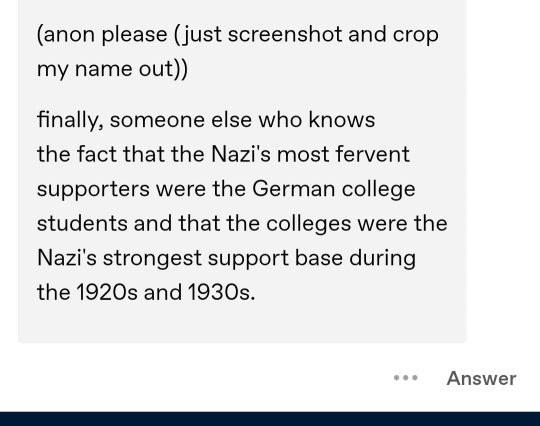#completely military dictatorship
Explore tagged Tumblr posts
Text

how about we stop throwing that word around after it’s shown itself to be more true for the person using it than the person it’s used to describe <3
#caitlyn would you please shut your mouth and think for one second#threatening unjust punishment and torture#completely military dictatorship#suppression of an entire group of citizens#discrimination against every person with blue hair bc it could be a sign of resistance#this is what we call…. descent into fascism#take a good hard look into the mirror sweet cait and get started on that redemption arc please#arcane s2#arcane s2 spoilers#arcane
21 notes
·
View notes
Text
I'm having a Sheila moment nobody talk to me
#fugo.txt#shes the daughter of exiled latinoamericans from the last military dictatorship btw she told me#shes south american <3 shes mapuche too. btw#i think theres something that makes me insane about the fact that she was just a kid. and like thats the theme with so many part 5 chars#but she was just TEN. she was just a little girl. she had no family left she didnt even have her dog. she was completely alone#and she STILL is. that's the thing tnat gets me so fucking bad. she still is alone#i. UGH. fuck man#I NEED to talk about her but im so incoherent#i need to open that light novel and read out every single one of her lines and explain every detail#i have like 3 oral exams but all i can think of is her
1 note
·
View note
Text
One is a convicted criminal that wants to:
Institute a dictatorship “on day one only” (with majority support from his party!)
Give a greenlight to Project 2025
Use a weakened Schedule F to install THOUSANDS of cronies
Institute military tribunals for his political enemies (and allies!)
Gun down “enemies from within”
Support Russia in wiping Ukraine off the map
Use the combo of the removal of the Chevron deference/the Supreme Court allowing people to openly bribe them/Schedule F to extend the far-right’s reach into every government agency and deregulate everything to the benefit of his rich capitalist buddies
Has gotten total immunity for “official acts” (what counts as “official”? Whatever his Schedule F appointed judges choose of course.)
Already took away so many freedoms from racial minorities/queer people/women/anyone-that-isn’t-a-rich-white-man that it would take ages to list them all in this post
and so so so so SO MUCH MORE.
The other is a typical neoliberal politician.
Remember also, you’re not just choosing a president, you’re choosing their cabinet, potential Supreme Court justices, federal employees as well. With the above listed ALONE, Trump would do so much more damage than just what he can do himself. That’s not including everything else his Federalist Society Supreme Court would and have given him on a silver platter. Supreme Court Justices are for LIFE, and we’ve already seen the potentially irreparable damage this far-right activist court has done to the fabric of democracy.
Project 2025 really deserves a part to itself just to list some of what it includes: complete abortion/contraceptive ban (no exceptions), destroying worker’s unions and protections, remove Social Security/Medicare/Affordable Care Act, end civil rights protections in government, ban teaching the history of slavery, remove climate protections while gutting the EPA, end equal marriage and enforce the “traditional family ideal”, use the military to gun down protests, mass deportation of legal immigrants (especially Muslims), ending birthright citizenship, pack the lower courts, and plenty more. The far-right wasn’t able to take full advantage of Trump’s presidency the first time since it was so unexpected. They’re preparing so that they won’t make the same mistake again. THERE ARE OVER 900 PAGES OF POLICIES AND PLANS THAT THEY ABSOLUTELY WILL IMPLEMENT IF THEY WIN. READ IT. Anyone that says they won’t is either a liar or already drank the Kool-Aid. Isn’t it interesting that every politician that supports it, including his vice president, wants Trump to win?
Not to mention, if you care about Palestine (like I do, a lot), Trump would be MUCH WORSE for Palestine than the other candidate, supporting Bibi going “from the river to the sea” and already cut off millions in aid to Palestine in 2018 (which Dems reversed!). If you support a free Palestine and don’t vote blue, you have categorically hurt them more than if you did. Even Palestinians themselves want the Democrat candidate over Trump. There is no quick and bloodless peace deal that both Palestine and Israel would ever agree to. The road to an end of the Palestine-Israel conflict is going to be long and difficult, probably decades of dedicated de-radicalization in both states, and will involve far more than one person’s decisions in the end. Unless Trump takes power, and avoids all that by sending enough bombs to turn the Gaza Strip into dust.
There are a few reasons you would choose to vote third party in a FPTP system (support ranked choice voting btw) or not vote “in protest” while ignoring all the state and local elections that affect your area more than the president. Either you’re privileged enough to not be affected by what Trump would bring, you’re ignorant of the consequences, or you care more about doing nothing perfectly rather than doing something, anything that isn’t 100% ideologically “pure” to fight against the far-right fascist movement.
Am I a democratic socialist? Yes. Am I a realist? Also yes. In every single down-ballot race, and through my activism, I will fight for the rights of the oppressed and working-class. But the Presidency isn’t fucking winnable right now, and probably won’t be for decades. Pro-corporatist/anti-worker sentiment is baked into the fucking bones of this country and its people. A majority of eligible voters wouldn’t vote for Bernie, and he’s barely center-left. Voting for anything other than one of the two big parties is a useless feel-good gesture at the moment. Or you’re a dumbass accelerationist, and if you are, honestly go fuck yourself.
Let’s say you want a socialist revolution, full-tilt government takeover. I want that too, in my wildest dreams! We’re on the same page there. So how are you going to do it. How? HOW? What pro-worker activist groups are you working with? Are you encouraging your workplace to form a union? Volunteering for/donating to your local farmers’ co-op? Canvassing for pro-worker legislation? Hell, even something as small as distributing free copies of high-school/college textbooks, so that those of poorer means have a better chance at affording advanced education? Are you doing anything to help? Any praxis at all, rather than typing wishful thoughts of revolution alongside insults to people who aren’t as “correct” as you on the internet?
Every voter that still supports Trump is energized by every cruelty he enacts, while millions of Democrats and third-partyists care more about purity tests and manifesting socialist revolution tulpas than avoiding a fascist dictatorship.
Have a brain, touch grass, and vote blue all the way down that fucking ballot.
#us politics#politics#election#us elections#vote democrat#vote blue#chevron doctrine#gaza genocide#late stage capitalism#donald trump#kamala harris#socialism#marxism#anti capitalism#communism#leftism#please vote#please please please#please tell me you’ll vote#please
3K notes
·
View notes
Text
The thing about comparing various political candidates to Hitler is not only that you look like an idiot, but Hitler is dead. The original Nazis are dead or pushing over 90 years old. While we can argue about how successful desnazification was, Nazi Germany was crushed and defeated. Almost a century ago.
Fascism still exists as an idea. Neo-nazism exists as an idea. Fascism is dangerously on the rise today. But these aren't dead nazis rising from the tomb, with the possible exception of the AFD (and even that is arguable). They are the result of modern, current dynamics that are happening right now. Why do you think we see things that for Hitler would be heresy, like Slavic neonazis or white supremacists supporting Israel? Because they are not ghost nazis marching from the 1940s, they're new currents of fascist and ideological allies that have been born from the current conditions of today.
In Argentina, we see the agrarian landowner conservatives allying with the libertarian movement which has found ways to revindicate the murderous military dictatorships to the youth. In the United States, we see the neoconservatives who support the military-complex with the alt-right, the evangelical Dominionists, and a current of white supremacism that has it's roots in the KKK rather than Hitler. And so with other countries. Every country has it's own roots of fascism and it's own horrible expressions, but actual nazis or rather neo-nazis, while present everywhere, aren't the dominant enemy right now.
(in fact, the current expansion of white supremacism is, at is root, almost completely Usamerican in ideological origin, as the US exports it's products and culture, it also exports it's ideological extremists)
To understand and combat fascism one has to understand how it manifests in different periods and places, and how the whole spectrum of the right, while broadly allied in the defense of the current capitalist/imperialist system, has many different currents on it that require different approaches.
516 notes
·
View notes
Note
have u seen that artists r getting death threats on twitter over hc viktor as russian 😭
I have seen a literal friend of mine get stupidly angry comments from new age arcane fans who swear up and down he's been czech all his life and it truly boggles the mind. that's straight up not true. Viktor was created as a russian communist caricature by an american corporation. he was "villainous crazy russian guy" for twelve years, the funny harry lloyd czech impression only started out 3 years ago. We're just doing cold war propaganda all over again now???
viktor being russian =/= liking the ghoulish russian government. You aren't giving Putin an endorsement, you're drawing a cartoon faggot //russian immigrant allegory// who would get deported by the CIA during the first red scare. Viktor can be russian. there's gay and trans and disabled russian people who are discriminated against & very much at risk at at a home country that is hostile and controlling towards its own citizens, and when they try to get out of that oppressive environment there's all these preloaded notions painting them as "untrustworthy" or "inherently shady" thanks to the Russian Enemy american popculture slop archetype.
My own country has gone through decades of horrific dictatorship before! Through the hands of our own military forces and highly aided by the USA, profiting off our misery! Should our people as a whole be conflated with the military troops that abducted protesters into death-torture camps? Should our people as a whole be represented by the worst geriatric nationalistic bigots who can plant themselves in power? Is this how we look at the whole world? This is a dangerous line of thought. I get that a lot of arcane fandom is young but that is a rightwing calling card line of thought. If we're all to be represented exclusively by a sum of our Leading Cops, we're deep in the muddy shit. I don't even like these pigs in a good day. If you're an american saying this, especially? LOOK AT YOUR OWN FUCKING TROOPS. YOU'RE THE IMPERIAL CAPITAL. IT'S YOU.
It also stands out to me that viktor league of legends was perfectly fine as crazy evil russian stock villain n.99999 for 10+ years, but as soon as he gets an adaptation that depicts him as empathetic/altruistic and well intentioned all the way through, humanized like a proper human being... the americans in charge conveniently drop the 'russian' part of his persona. (but oh, they keep the red scare stuff. and they keep the stuff about communism being a path to certain evil, they just cut out the russian identification, so people have a harder time criticizing it.) I don't think that is a neutral decision, and its not one I'm interested in reproducing.
It's completely fine to have your own hcs, but I don't like the shallow conversations around this. Viktor isn't a representation of the russian government; but he is, fundamentally, a byproduct of how american propaganda rules the entire world and defines who gets to be alienated as the villain forever. We used to see this with china A LOT as well (still do!), and it only changed after a whole lot of effort, be it by chinese immigrants or the proliferation of media depicting them as whole, multifaceted people, distanced from the american-made boogeymen. The common citizen is not my enemy. It shouldn't be yours either.
402 notes
·
View notes
Video
youtube
How Trump is Following Hitler's Playbook
You’ve heard Trump’s promise:
TRUMP: I’m going to be a dictator for one day.
History shows there are no “one-day” dictatorships. When democracies fall, they typically fall completely.
In a previous video, I laid out the defining traits of fascism and how MAGA Republicans embody them. But how could Trump — or someone like him — actually turn America into a fascist state? Here’s how in five steps.
Step 1: Use threats of violence to gain power
Hitler and Mussolini relied on their vigilante militias to intimidate voters and local officials. We watched Trump try to do the same in 2020.
TRUMP: Proud Boys, stand back and stand by.
Republican election officials testified to the threats they faced when they refused Trump’s demands to falsify the election results.
RAFFENSPERGER: My email, my cell phone was doxxed.
RUSTY BOWERS: They have had video panel trucks with videos of me proclaiming me to be a pedophile.
GABRIEL STERLING: A 20-something tech in Gwinnett County today has death threats and a noose put out saying he should be hung for treason.
If the next election is close, threats to voters and election officials could be enough to sabotage it.
Step 2: Consolidate power
After taking office, a would-be fascist must turn every arm of government into a tool of the party. One of Hitler’s first steps was to take over the civil service, purging it of non-Nazis.
In October of 2020, Trump issued his own executive order that would have enabled him to fire tens of thousands of civil servants and replace them with MAGA loyalists. He never got to act on it, but he’s now promising to apply it to the entire civil service.
That’s become the centerpiece of something called Project 2025, a presidential agenda assembled by MAGA Republicans, that would, as the AP put it, “dismantle the US government and replace it with Trump’s vision.”
Step 3: Establish a police state
Hitler used the imaginary threat of “the poison of foreign races” to justify taking control of the military and police, placing both under his top general, and granting law-enforcement powers to his civilian militias.
Now Trump is using the same language to claim he needs similar powers to deal with immigrants.
Trump plans to deploy troops within the U.S. to conduct immigration raids and round up what he estimates to be 18 million people who would be placed in mass-detention camps while their fate is decided.
And even though crime is actually down across the nation, Trump is citing an imaginary crime wave to justify sending troops into blue cities and states against the will of governors and mayors.
Trump insiders say he plans to invoke the Insurrection Act to have the military crush civilian protests. We saw a glimpse of that in 2020, when Trump deployed the National Guard against peaceful protesters outside the White House.
And with promises to pardon January 6 criminals and stop prosecutions of right-wing domestic terrorists, Trump would empower groups like the Proud Boys to act as MAGA enforcers.
Step 4: Jail the opposition
In classic dictatorial fashion, Trump is now openly threatening to prosecute his opponents.
TRUMP: if I happen to be president and I see somebody who’s doing well and beating me very badly, I say, ‘Go down and indict them.’ They’d be out of business.
And he’s looking to remake the Justice Department into a tool for his personal vendettas.
TRUMP: As we completely overhaul the federal Department of Justice and FBI, we will also launch sweeping civil rights investigations into Marxist local district attorneys.
In the model of Hitler and Mussolini, Trump describes his opponents as subhuman.
TRUMP: …the radical left thugs that live like vermin within the confines of our country…
Step 5: Undermine the free press
As Hitler well understood, a fascist needs to control the flow of information. Trump has been attacking the press for years.
And he’s threatening to punish news outlets whose coverage he dislikes.
He has helped to reduce trust in the media to such a historic low that his supporters now view him as their most trusted source of information.
Within a democracy, we may often have leaders we don’t like. But we have the power to change them — at the ballot box and through public pressure. Once fascism takes hold, those freedoms are gone and can’t easily be won back.
We must recognize the threat of fascism when it appears, and do everything in our power to stop it.
424 notes
·
View notes
Text
Mass Effect can't even be accurately described as "liberal" tbh since the intergalactic society it depicts isn't even remotely democratic even in liberal-bourgeoisie terms. It's literally a triumvirate (latter quadrumvirate) dictatorship that relies on a secret police with total supralegal autonomy and an explicitly fascist empire's (the turians) military for enforcement, which arbitrarily decides which species are "important" enough to be given diplomatic representation and has conducted at least two near-complete genocides in its history. The writing pretty much always lands on the side of "what the galaxy really needs is some tough, martial military/police types to cut through what little bureaucracy and political representation there is to Get Things Done." It's straight up Imperium of Man-levels of dystopian and the game doesn't even seem to comprehend it really. The most "liberal" thing about the games are their upholding of the insanely fucked up status quo as the "best" option for you go take.
673 notes
·
View notes
Note
the thing to remember is that the supposed might of the yankees is very much propaganda. a lie designed to make you think you don't stand a chance. but if we look at history the story is completely different. they lost in afghanistan. they lost in vietnam. the many military dictatorships in latin-america and the rest of the world they propped up lost. the native peoples of the so called united states are still here. and just like that their little murderous client state israel will lose in palestine.
there's no real way for them to win other than to make you believe they've won. apart from the myriad ways to materially resist and learn from those who've been or are in this situation, inculcate in yourself and those around you: you haven't lost until you've given up.
it's true! A colonial power fighting against a decentralized, asymmetrical resistance that is local to the region is always operating at a massive (and expensive) disadvantage. Thanks Anon.
69 notes
·
View notes
Text

I keep seeing such comments on my notes which makes me wonder: what did I miss?
"The Handmaid's Tale" draws on global histories.
Atwood was inspired by what happened:
during the Iranian Revolution (1978-1979),
in Philippines under Ferdinand Marcos,
in Germany (The Lebensborn project),
in Romania under Nicolae Ceaușescu,
in Cambodia under the Khmer Rouge,
in Stalinist Russia.
She was also inspired by what happened to Argentinean women during Jorge Rafael Videla's military dictatorship which was backed by the US.
But killing the pregnant women was a crime that even Argentina’s military men – who referred to themselves in self-aggrandising speeches as defenders of “western and Christian civilisation” – couldn’t bring themselves to commit. Instead, they kept pregnant activists alive until they gave birth, murdering them afterwards and handing their babies to childless military couples to raise as their own. It was, in a macabre sense, the military’s ultimate victory against a despised enemy they had decided to annihilate completely. It is estimated some 500 children were born under these circumstances.
(x)
And what happened to Spanish women under Franco.
Known as the lost children of the Franco-era, as many as 300,000 babies are estimated to have been abducted from their mothers under General Francisco Franco, who ruled Spain from 1939-75, and in the decades after.
The theft of newborns began in the 1930’s after the Spanish Civil War as an ideological practice, stripping left-wing parents or Franco-opponents of their children as a way of ridding Marxist influence from society. But in the 1950’s, the practice expanded to poor or illegitimate families who were seen as economically or morally deficient, Agence France-Presse reports.
New mothers were often told their babies had died and the hospital had taken care of the burials. These babies were allegedly sold for adoption and involved a wide network of doctors, nurses, nuns and priests, according to AFP. The system carried on after Franco’s death in 1975 until 1987, when a new law was implemented regulating adoption.
(x)
"When I wrote 'The Handmaid's Tale', nothing went into it that had not happened in real life somewhere at some time," she said.
#like look at what's happening to women in Afghanistan right now with the Taliban#and how Ukrainian children were trafficked by Russians.#tht#atwood
706 notes
·
View notes
Text

Exactly, Anon. Exactly. This is why the Ivy League Universities being turned into Hamasnik terrorist bases is so horrifying. Especially with Jew-hating students attacking Jewish students and professors on campus, with the Universities' sanction. The Universities could shut these Jew-hate riots down. The fact that they don't shows that they want them to continue. They're trying to chase away the Jewish students and professors from these schools. That's always the first step. That's what the Nazis did first, too.
This article is taken from the US Holocaust Memorial Museum website. I highly recommend that everyone read the whole article. But even if you read the first paragraph, you'll see the parallels to what is happening on Ivy League campuses today:
.
After Adolf Hitler was appointed German Chancellor in January 1933, the new Nazi government began an effort to completely reorder public and private life in Germany.
The Nazi regime quickly targeted German universities—among the most elite in the world at the time—for restructuring according to Nazi principles. While the Nazi Ministry of Education initiated reforms, local Nazi organizations and student activists worked to bring Nazi ideals to German campuses. These forces, along with increasing antisemitism under Nazi rule, transformed everyday life at German universities. Throughout this period, students, faculty, and staff made individual decisions that both upheld and opposed Nazi ideology.
With the passage of the "Law for the Restoration of the Professional Civil Service" in 1933, most Jewish professors in Germany were dismissed from their positions. Others, such as Professor Eugen Mittwoch, were able to keep their posts temporarily only due to the political value of their research. After purging Jewish and "politically undesirable" faculty, the regime then targeted the student body with the "Law Against Overcrowding in Schools and Universities." As German authorities continued to "Aryanize" German universities, Jews increasingly lost the opportunity to teach or study. Many non-Jewish Germans sought to benefit from their persecution.
The daily business of university life continued in the wake of these new policies, but political concerns increasingly influenced the way professors and students worked and studied. The practice of denunciation, as demonstrated by the "Request for the Investigation of Professor Hans Peters," illustrates the danger posed to both students and faculty if they failed to follow new ideological norms. Those willing to voice support for the new regime—whether out of enthusiasm or practicality—often received promotions or other rewards. Meanwhile, many others quietly accepted the new policies and passively benefited from the persecution of their Jewish peers. Very few, such as the small student group in Munich known as the White Rose, took any significant action to resist the Nazi dictatorship.
The Nazi government and its supporters manipulated several aspects of the country's traditional university system to turn German higher education into a crucial source of support for the new regime. For example, the German student population had been largely male long before the Nazi rise to power, and German campuses were dominated by fraternities. Those organizations maintained traditional military discipline and dress codes, and their alumni groups exercised significant political power both before and after 1933. Fraternities—often working with the Student Council and Nazi Student League—served as a powerful and violent force for implementing Nazi principles at universities, often going beyond the party platform in their radicalism. A Report on the Camaraderie House for Female Students of Göttingen shows how Nazi student groups used the format of traditional student organizations to train both men and women to become the next generation of Nazi leaders.
Although the regime could rely on many committed student activists, the Third Reich also sought the support of German professors to lend legitimacy to their policies. Because German universities were state institutions, professors' academic careers became vulnerable to the whims and wishes of the Nazi state. While only a small minority of professors had been Nazi Party members before 1933, several prominent professors quickly voiced their support for the Third Reich. In the new German university, political loyalty was valued over academic ability in the assessment of students and in the selection and promotion of professors. Authorities infused university classrooms with Nazi ideology—as shown in the document, "Foundation of the Advanced School of the German Reich". But prioritizing politics over academics affected the quality of German higher education.
Nevertheless, professors—even enthusiastic supporters of the new regime—often spoke out against some aspects of Nazi policy. The case of Eduard Kohlrausch shows how his opposition to student-led book burnings caused his removal from the university administration. Dissent against individual policies, however, did not give rise to any concerted resistance movements. German universities as a whole formed a solid base of support for the Nazi regime, contributing valuable knowledge to the development of technology for the war effort as well as logistical support for the Holocaust.
The Nazification of universities overwhelmed the daily lives of students with new requirements, including mandatory lectures, physical exercises, labor duties, and political assemblies. Many students resented those requirements, even if they supported the Nazi Party. In Heidelberg, for example, where the daily life of students was dominated by political instruction and mandatory physical training, large numbers of students withdrew from the university in search of other educational opportunities. As illustrated in the "Memo Regarding Maria-Elisabeth Koch," students also showed varying degrees of enthusiasm for the labor service that was often required of them in territories occupied by Nazi Germany.
The Nazi government's project of remaking German universities was broadly successful, but it produced unintended consequences. The quality of education suffered significantly as classes were regularly cancelled for political assemblies and students' schedules became filled with ideological and paramilitary training. Moreover, purging Jewish faculty deprived German universities of valuable expertise. Within a few years, many observers in Germany and abroad became deeply skeptical about the quality of German higher education in the Third Reich. Propaganda efforts such as the Carl Schurz tour for American professors and students—documented with a slickly produced video—did not prevent protest. The 550th-anniversary celebration of Heidelberg University met with opposition in Europe, even while prominent American universities such as Harvard accepted invitations.
With the defeat of the Third Reich in 1945, Allied forces occupying Germany began a long-term effort to remove the influence of Nazi ideology in German society. Many German academics who made significant contributions to the Nazi war effort fled to the United States, where they lived comfortable lives and their expertise was highly valued by American universities and the US military. In postwar Germany, many faculty and students who had benefited from the Nazis' discriminatory policies without being especially vocal or enthusiastic supporters of the regime sought to cast their dissent or their silence as forms of political resistance to obscure their own complicity. Although many Germans denied having supported the Nazi regime, antisemitism persisted in postwar Germany. The case of Hermann Budzislawski shows the difficulties encountered by the relatively few German Jews who decided to return to Germany after World War II.
Sources in this collection document the choices facing students and faculty pursuing their everyday lives in the shadow of Nazism and the Holocaust. Over the course of this period, as antisemitic discrimination escalated to mass murder, the higher education system proved to be a source of support—rather than opposition—to the party's project of remaking German society.
#jumblr#jewish history#the goyim are trying to speedrun the 1930s#goyim have always naively asked “How could the Nazi regime have murdered 6 million Jews??” - and now they're giving us the answer#Jew-hate makes you stupid#NOTE: I report and block antisemites. Any antisemites who comment on this post will be reported and blocked. You have been warned.
150 notes
·
View notes
Text
I am hesitant to suggest a “descent into fascism” narrative about Israel. The State of Israel has always been fascistic in relation to its Palestinian subjects. In the entirety of Israel’s modern history, there were only a scarce few months where at least hundreds of thousands of Palestinians were not living under its martial law and military dictatorship: between the end of apartheid military rule over the subject class of Palestinians remaining after the Nakba in what became Israel (1949-1966) and the capture of the other Palestinian territories and the creation of the Israeli Military Governorate (1967 onwards). These systems of Israeli military rule over Palestinians can only be adequately described as totalitarian: through 1994, they entailed complete bans on any Palestinian political activity or freedom of expression; incarceration (often without trial or even charges) at rates far exceeding anything seen in Soviet gulags or the American prison-industrial complex; and state control over all areas of life through checkpoints, secret police, kangaroo courts, torture, and surveillance. Taken together with the racial ideology of the state, it is difficult to draw clear boundaries between the Israeli occupation regime and other fascist states historically.
Mason Herson-Hord, A Second Nakba: Paving the Way to Genocide
356 notes
·
View notes
Note
You know the TFA Decepticons aren’t an oppressed minority right? DJW even said their Rise Up rhetoric was a jab at how conservatives preach about Protecting Freedoms, and in the Allspark Almanac it’s explained they wanted to colonize other planets and the Autobots objected to that. The Decepticons were exiled for being military fascists.
I'd really, really love to know where I've ever said that on this blog, but since you seem very convinced that I did, let's look at the lore again. I don't feel like trawling the internet for this specific tweet/whatever form this DJW evidence has, so if you have that, I'd love to see it.

This timeline from the Allspark Almanac II pretty clearly states that the entire crux of Cybertronian society as a whole has rested on colonization, very early on in their species' history. Their "Golden Age" 8 billion stellar cycles ago is characterized by expansion that led to the colonization (!!!) of their solar system, further colonization only prevented by isolationism.
The earliest indications of the factional split that mark their history exist within the ruling class Guardians and the Malignus, defined as a "military caste". This implies that Golden Age Cybertron existed as a caste system. Which I would take a guess as not being particularly great.
And when we get to the first (again, quoted from the text here,) "military coup", it's executed by the political ancestors of the Autobots. Not a peep about the Malignus while that was going on.
This faction eventually becomes the Protectobots, and the most notable thing about them is that their leader attempted a Great Purge of "undesirable elements" from their society. I'd be hard pressed to think I'm wrong in thinking that's kinda fucked up. We're not given explicit reasons for this 17 million year war, but wars don't happen without someone to oppose someone else, and we get this in the form of the Destrons.
As for the point about colonization: my point is not that the Decepticon's motivations are not what we see in canon. Not at all. My point is that the Autobots have the same fucking motivation.

The Age of Expansion literally begins when the Autobots take power! It only ends when they butt heads with the Quintessons! Colonization, militarism, and facism, as you put it, are not traits that are unique to Decepticons.

And, according to this timeline and historical reasoning given, there is no mention of either faction's position on further expansion. The formation of the Decepticons is rooted in the divide between labor and military aligned Cybertronians. Both sections are equally responsible for the imperialistic efforts of their Empire/Commonwealth/whatever you want to call it, and make no mistake, this does continue into the present day! From both factions!
Assuming you're referring to my hefty lean towards the Cons in terms of character/exploration interest in the gist of your message, my goal here is not to elevate them to the same Good Guy Status the Autobots have by virtue of being the protagonists. I am fully and completely aware that they are a group of insane zealots that have rallied under a guy who was described by his own VA as an "elegant bully". Rather, I think what you're picking up on is my focus on the fact that the Autobots in Animated have more than their fair share of insidious shit going on.
They retain what is essentially a military dictatorship, with the position of Magnus being only theoretically beholden to the will of the Council and Guilds, as seen when Sentinel was able to fire Fortress Maximus with no approval from the Council and got nothing more than a disapproving sentence from Alpha Trion. We have no word on how their schooling institutions work, but all of it seems heavily centered on their version of the military they've concocted in the absence of warbuilds. And, just in case we forgot about Sentinel's proposed budget...

And that's not even getting into how fucked up Autobot culture is! They're unspeakably xenophobic, throw around propagandistic phrases like they're nothing ("Cogs in the Great Autobot Machine", anyone?), have an incredibly questionable justice system if Wasp is anything to go by, and this only seems to be getting worse at the end of Season 3, if Sentinel's curfews and public service announcements are anything to go by.
I'm not trying to make the Decepticons look better. I'm trying to make the Autobots look worse.
#tl:dr I don't believe I've ever said that and anyway I'm fully aware they're not#what I believe we're looking at here is an insane set of species-wide neuroses#that have been historically crystallized into two unbelievably shitty factions#nobody here is having a good time.#ANYWAY. kinda curious about what sparked this anon?#were these the vibes you got from Darkest Hour? did you just decide I seemed like I liked the Cons too much?#genuinely very interested to know#asks#tf#tfa#transformers#transformers animated#maccadam
118 notes
·
View notes
Text

This propaganda poster from WWII is a misquote. However, it's an interesting misquote.
Yamamoto never actually said, as he was depicted saying in a movie decades later, "I fear we have awakened a sleeping giant and filled him with a terrible resolve". He'd never say that because he knew damn well Pearl Harbor would be doing exactly that long before the decision to go to war was made. The poster's quote comes from something Yamamoto said, but badly distorted. The reality was:
Should hostilities once break out between Japan and the United States, it is not enough that we take Guam and the Philippines, nor even Hawaii and San Francisco. To make victory certain, we would have to march into Washington and dictate the terms of peace in the White House.
Much less cocky, of course, but outlining their goal at least, right? Well, the sentence right after is:
I wonder if our politicians, among whom armchair arguments about war are being glibly bandied about in the name of state politics, have confidence as to the final outcome and are prepared to make the necessary sacrifices.
That's hyper-polite Japanese speech mixing with hyper-polite please-don't-execute-me fascist military dictatorship speech for "what you're asking for is completely fucking impossible and you should be ashamed of your ignorance for even suggesting it". He might as well have added that the most realistic way of achieving that would be to go to occupied China and dig until they come out under Washington.
96 notes
·
View notes
Text










I made a rec list for Latin American books that have queer themes
*DISCLAIMER: "Queer" is not a theme per se. Sometimes it's about identity, sexuality, love, horror, violence, etc. All happening around queer characters.
Most of these deal with pretty heavy themes: prostitution, rape, violence, aids, death. Some representations can be considered "problematic" if you're boring. There are different ways to approach queerness.
Feel free to yell at me about these books/ask where to read them/make recommendations/etc. I definetly have favourites. Also some have movie adaptations.
Descriptions and warnings under the cut
La condesa sangrienta (The bloody countess):
The story of countess Erzebeth Báthory, a medieval hungarian countess know for committing more than 650 murders and inspiring the figure of the vampire. There´s no explicit queer relationships here but there´s absolutely some homoerotism in the narrations of torture. Pizarnik was a lesbian also. TW: disturbing, torture, blood, murder, you should not read this in one go.
El lugar sin límites (Hell has no limits):
The story about la Manuela, a homosexual transvestite that owns half a brothel in a small town. Her daughter owns the other half. The novel shows crudely the misery of forgotten towns and the day to day life of prostitution. There's also a movie. TW: prostitution, murder, homo/transphobia.
El mundo alucinante (A Hallucinations):
A fantasy and free version parody of the Memoires of Fray Servando Teresa de Mier. Known for the uses of magical realism and innovative prose.
Cobra:
Two stories meet. The first is of Cobra, a transvestite, and her transformation. The second of her initiation in a band of black jackers. Erotism and death.
Evita vive (Evita lives):
A controversial book around Eva Perón (after her death) who lives among prostitutes and homosexuals, having orgies and living a life of debauchery.
El beso de la mujer araña (The kiss of the spider woman):
The meeting of two prisoners living in the same cell. One, Valentín, is a political prisoner and the other, Molina, is a sexual deviant. During their weeks there, Molina narrates movies to Valentín and their relationship develops. There's also a movie.
Stella Manhattan:
During Brasil's military dictatorship, the apolitical Eduardo, a.k.a. Stella Manhattan, is expelled form his country for his shameful homosexuality. He returns to the surface as a brazilian counsil in New York and is immediately accosted by a military called Colonel Vianna, a sadomasichist known as the "Black Widow", and by the guerrillas seeking his befall.
Antes que anochezca (Before night falls):
Th 7th of december of 1990 the Cuban author Reinaldo Arenas, in a terminal phase of AIDS, would commit suicide, leaving behing this moving and political testimony, which he finished mere days before taking his own life.
Salón de belleza (Beauty salon):
In a large, unnamed city, a strange, highly infectious disease begins to spread, afflicting its victims with an excruciating descent toward death, particularly unsparing in its assault of those on society's margins. Spurned by their loved ones and denied treatment by hospitals, the sick are left to die on the streets until a beauty salon owner, whose previous caretaking experience extended only to the exotic fish tanks scattered among his workstations, opens his doors as a refuge. In the ramshackle Morgue, victim to persecution and violence, he accompanies his male guests as they suffer through the lifeless anticipation of certain death, eventually leaving the wistful narrator in complete, ill-fated isolation.
Bajar es lo peor (Going down is the worst):
With gothic resonances, Enríquez shows crudely the Buenos Aires of the 90's. The confinement and the paranoia of cocaine, sex as a means to escape or survive, political unbelief, mix with a romantic love that never reaches satisfaction. There's also a movie. TW: drugs, prostitution, rape, suicide.
Loco afán (Mad eagerness):
These "chronicles of aids" narrate stories of homosexuality in Latin America, focused on drag, transvestites and AIDS.
Sirena Selena vestida de pena:
Discovered by Martha Divine in the backstreets of San Juan, picking over garbage, drugged out of his mind and singing boleros that transfix the listener, a fifteen year old hustler is transformed into Sirena Selena, a diva whose uncanny beauty and irrisistable voice will be their ticket to fame and fortune. Auditioning for one of the luxury hotels in the Dominican Republic, Selena casts her spell over Hugo Graubel, one of the hotel's rich investors. Graubel is a powerful man in the Republic, married with children. Selena, determined to escape the poverty and abuse s/he suffered as a child, engages Graubel in a long seduction in this mordant, intensely lyrical tragi-comedy - part masque, part cabaret - about identity (class, race, gender) and "the hunger and desire to be other things."
Tengo miedo torero (My tender matador):
It is the spring of 1986, and Chilean dictator Augusto Pinochet is losing his grip on power. In one of Santiago’s many poor neighborhoods, a man known as the Queen of the Corner embroiders linens for the wealthy. A hopeless and lonely romantic, he listens to boleros to drown out the gunshots. Then he meets Carlos, a young, handsome man who befriends the aging homosexual and uses his house to store mysterious boxes and hold clandestine meetings. And as the relationship between these two very different men blossoms, they find themselves caught in a revolution that could doom them both. There's also a movie.
Adiós mariquita linda (Goodbye pretty pansy):
Chronicles of ire, delation, passion, resentment and loves. Stories of different cities and travels.
Sexografías (Sexographies):
In fierce and sumptuous first-person accounts, renowned Peruvian journalist Gabriela Wiener records infiltrating the most dangerous Peruvian prison, participating in sexual exchanges in swingers clubs, traveling the dark paths of the Bois de Boulogne in Paris in the company of transvestites and prostitutes, undergoing a complicated process of egg donation, and participating in a ritual of ayahuasca ingestion in the Amazon jungle--all while taking us on inward journeys that explore immigration, maternity, fear of death, ugliness, and threesomes. Fortunately, our eagle-eyed voyeur emerges from her narrative forays unscathed and ready to take on the kinks, obsessions, and messiness of our lives. Sexographies is an eye-opening, kamikaze journey across the contours of the human body and mind.
Los topos (The moles):
The son of missing persons of the Dictatorship casually meets a half-brother who poses as a transvestite to investigate ex repressors and cops.
La virgen cabeza (Slum virgin):
When the Virgin Mary appears to Cleopatra, she renounces sex work and takes charge of the shantytown she lives in, transforming it into a tiny utopia. Ambitious journalist Quity knows she’s found the story of the year when she hears about it, but her life is changed forever once she finds herself irrevocably seduced by the captivating subject of her article.
Falsa liebre (False hare):
The darkness at the port engulfs everything. Pachi and Vinicio go deeper into the beach, approaching an improvised party. They are looking for something to numb their bodies, something to finally erase themselves. Summer has been long, and that day was much worse. Not far from there, Zahir fantasizes about his next travel to the capital city or the northern part of Mexico, away from the aunt who keeps asking him for money, controls him through physical violence, and has driven his little brother, Andrik, to run away from the family home and end up in another: a man’s house, who caresses Andrik and then strikes him with the same hand. Now Zahir must not only convince Andrik to start a new life, but make sure they find a way out of that seemingly endless beach. TW: rape, prostitution, violence.
Ladrilleros (Brickmakers):
Oscar Tamai and Elvio Miranda, the patriarchs of two families of brickmakers, have for years nursed a mutual hatred, but their teenage sons, Pájaro and Ángelito, somehow fell in love. Brickmakers begins as Pájaro and Marciano, Ángelito’s older brother, lie dying in the mud at the base of a Ferris wheel. Inhabiting a dreamlike state between life and death, they recall the events that forced them to pay the price of their fathers’ petty feud. The Tamai and Miranda families are caught, like the Capulets and the Montagues, in an almost mythic conflict, one that emerges from stubborn pride and intractable machismo. Like her heralded debut, The Wind That Lays Waste, Selva Almada’s fierce and tender second novel is an unforgettable portrayal of characters who initially seem to stand in opposition, but are ultimately revealed to be bound by their similarities. TW: violence.
Cuerpo a tierra (Body to the ground):
We aren't always owners of our own decisions, sometimes we´re pulled by an irrecognizable impulse and, sometimes, the only truth is that of the body. Betrayal and deception, love and heartbreak, love and search are the protagonists of these stories.
Temporada de huracanes (Hurricane season):
The Witch is dead. And the discovery of her corpse has the whole village investigating the murder. As the novel unfolds in a dazzling linguistic torrent, with each unreliable narrator lingering on new details, new acts of depravity or brutality, Melchor extracts some tiny shred of humanity from these characters—inners whom most people would write off as irredeemable—forming a lasting portrait of a damned Mexican village. There will be a movie by the end of the year. TW: rape, paedophilia, prostitution.
Pelea de gallos (Cockfight):
Ampuero sheds light on the hidden aspects of the home: the grotesque realities of family, coming of age, religion, and class struggle. A family’s maids witness a horrible cycle of abuse, a girl is auctioned off by a gang of criminals, and two sisters find themselves at the mercy of their spiteful brother. With violence masquerading as love, characters spend their lives trapped reenacting their past traumas. Heralding a brutal and singular new voice, Cockfight explores the power of the home to both create and destroy those within it. TW: rape, incest, violence.
Las aventuras de la China Iron (The adventures of China Iron):
1872. The pampas of Argentina. China is a young woman eking out an existence in a remote gaucho encampment. After her no-good husband is conscripted into the army, China bolts for freedom, setting off on a wagon journey through the pampas in the company of her new-found friend Liz, a settler from Scotland. While Liz provides China with a sentimental education and schools her in the nefarious ways of the British Empire, their eyes are opened to the wonders of Argentina’s richly diverse flora and fauna, cultures and languages, as well as to the ruthless violence involved in nation-building.
Mandíbula (Jawbone):
Fernanda and Annelise are so close they are practically sisters: a double image, inseparable. So how does Fernanda end up bound on the floor of a deserted cabin, held hostage by one of her teachers and estranged from Annelise? When Fernanda, Annelise, and their friends from the Delta Bilingual Academy convene after school, Annelise leads them in thrilling but increasingly dangerous rituals to a rhinestoned, Dior-scented, drag-queen god of her own invention. Even more perilous is the secret Annelise and Fernanda share, rooted in a dare in which violence meets love. Meanwhile, their literature teacher Miss Clara, who is obsessed with imitating her dead mother, struggles to preserve her deteriorating sanity. Each day she edges nearer to a total break with reality. TW: violence, cannibalism.
Las malas (Bad girls):
A trans woman's coming-of-age tale about finding a community among fellow outcasts. Born in the small Argentine town of Mina Clavero, Camila is designated male but begins to identify from an early age as a girl. She is well aware that she's different from other children and reacts to her oppressive, poverty-stricken home life, with a cowed mother and abusive, alcoholic father, by acting out-with swift consequences. Deeply intelligent, she eventually leaves for the city to attend university, slipping into prostitution to make ends meet. And in Sarmiento Park, in the heart of Córdoba, she discovers the strange, wonderful world of the trans sex workers who dwell there. Taken under the wing of Auntie Encarna, the 178-year-old eternal whose house shelters this unconventional extended family, Camila becomes a part of their stories-of a Headless Man who fled his country's wars, a mute young woman who transforms into a bird, an abandoned baby boy who brings a twinkle to your eye. TW: rape, prostitution, transphobia, murder, child death.
Nuestra parte de noche (Our share of the night):
A young father and son set out on a road trip, devastated by the death of the wife and mother they both loved. United in grief, the pair travel to her ancestral home, where they must confront the terrifying legacy she has bequeathed: a family called the Order that commits unspeakable acts in search of immortality. For Gaspar, the son, this maniacal cult is his destiny. As the Order tries to pull him into their evil, he and his father take flight, attempting to outrun a powerful clan that will do anything to ensure its own survival. But how far will Gaspar’s father go to protect his child? And can anyone escape their fate? Moving back and forth in time, from London in the swinging 1960s to the brutal years of Argentina’s military dictatorship and its turbulent aftermath.
Tesis sobre una domesticación (Thesis about a domestication):
A single transvestite is enough to undermine the foundations of a house, to untie the knots of compromise, to break a promise, to give up a life. The familiy clings to brief moments of happiness without noticing it´s been defeated since the start.
La hija única (Still born):
Alina and Laura are independent and career-driven women in their mid-thirties, neither of whom have built their future around the prospect of a family. Laura is so determined not to become a mother that she has taken the drastic decision to have her tubes tied. But when she announces this to her friend, she learns that Alina has made the opposite decision and is preparing to have a child of her own. Alina's pregnancy shakes the women's lives, first creating distance and then a remarkable closeness between them. When Alina's daughter survives childbirth – after a diagnosis that predicted the opposite – and Laura becomes attached to her neighbor's son, both women are forced to reckon with the complexity of their emotions, their needs, and the needs of the people who are dependent upon them. TW: child disease, family violence.
Huaco retrato (Undiscovered):
In an ethnographic museum in Paris, Gabriela Wiener is confronted with her unusual inheritance. She is visiting an exhibition of pre-Columbian artefacts, the spoils of European colonial plunder. As she peers through the glass, she sees sculptures of Indigenous faces that resemble her own - but the man responsible for pillaging them was her own great-great-grandfather, Austrian colonial explorer Charles Wiener. In the wake of her father's death, Gabriela begins delving into all she has inherited from her paternal line. From the brutal trail of racism and theft that Charles left behind to revelations of her father's infidelity, she traces a legacy of abandonment, jealousy and colonial violence, in turn reframing her own struggles with desire, love and race. Seeking relief from these personal and historical wounds, Gabriela turns to the body and desire as sources of both constraint and potential freedom.
Sacrificios humanos (Human sacrifices):
An undocumented woman answers a job posting only to find herself held hostage, a group of outcasts obsess over popular boys drowned while surfing, and two girls suspect sinister behavior from the missionaries lodging in their home. Simultaneously terrifying and exquisite, Human Sacrifices is "tropical gothic" at its finest. Ampuero considers the decay and oppression beneath the surface of our humid and hostile world, where those on the margins must pay the price for the comfort and safety of the elite. These twelve stories contemplate the nature of exploitation and abuse, illuminating the realities of those society consumes and leaves behind.
Soy una tonta por quererte (I'm a fool to want you):
In the 1990s, a woman makes a living as a rental girlfriend for gay men. In a Harlem den, a travesti gets to know none other than Billie Holiday. A group of rugby players haggle over the price of a night of sex, and in return they get what they deserve. Nuns, grandmothers, children, and dogs are never what they seem. These 9 stories are inhabited by extravagant and profoundly human characters who face an ominous reality in ways as strange as themselves.
Las indignas (The unworthy):
A searing, dystopian tale about climate crisis, ideological extremism, and the tidal pull of our most violent, exploitative instincts. TW: death, animal death, rape, cults.
#queer lit#queer#queer literature#latin american literature#queer latin american literature#literature#book recs#queer book recs
78 notes
·
View notes
Text




Happy 57th birthday to King Felipe of Spain!
Born 30 January 1968, Felipe Juan Pablo Alfonso de Todos los Santos de Borbón y Grecia is King of Spain, having ascended the throne on 19 June 2014 upon the abdication of his father.
Felipe was born in Madrid during the dictatorship of Francisco Franco as the third child and only son of Prince Juan Carlos of Spain and Princess Sophia of Greece and Denmark. Felipe was officially created Prince of Asturias in 1977, two years after his father became king.
On his 18th birthday on 30 January 1986, Felipe swore allegiance to the Constitution and to the King in the Spanish Parliament as required by the constitution, fully accepting his role as successor to the Crown.
To prepare for his future role as commander-in-chief of the Armed Forces, Felipe joined the Spanish Army in 1985. During the next two years, he completed his military training in the Navy and Air Force. After completing his civil and military studies, he undertook official duties representing his father in different social and institutional events, such as chairing charity foundations or attending inaugurations of Latin American leaders. At one of these events with the press, Felipe met TV news journalist Letizia Ortiz Rocasolano, whom he married in 2004. Felipe and Letizia have two daughters: Leonor, Princess of Asturias (19) and Infanta Sofía (17).
Felipe attended school at Santa María de los Rosales, and then high school at Lakefield College School in Ontario, Canada, and studied at the Autonomous University of Madrid, where he graduated with a degree in law. He completed his academic studies by obtaining a Master of Science in Foreign Service degree from the School of Foreign Service at Georgetown University in Washington, D.C., where he was the roommate of his cousin, Crown Prince Pavlos of Greece.
Felipe ascended the throne at the stroke of midnight on 19 June 2014: The next morning, after receiving the Captain General's sash from his father, he was formally sworn in and proclaimed king in a ceremony held in the Cortes. Upon his accession, he became the youngest monarch in Europe, being nine months younger than King Willem-Alexander of the Netherlands.
40 notes
·
View notes
Text
the trouble with "orthodoxy, autocracy, and reaction" as a governing ideology is that it is an ideology tailor made to support and entrench the government of god's chosen ruler of all russia, whose divine right cannot be questions, and what do you do if god happens to have chosen a complete twit. reactionary hagiographies of nicholas II try to offload the fault to the bloody, godless perverts of revolution, but that only goes so far--the bloody godless perverts of revolution aren't going to be able to lead the humble god-fearing tsar-loving souls of your empire away from the right path if your tsar isn't a complete twit, and knows how to )oh, i don't know, just spitballing here) do the minimum pr necessary to calm a strike getting out of hand in the capital city and also not let his military massacre several hundred protestors.
so there is a sense in which even by the aims of reactionaries (trying to maintain order and hold back revolutionary change at all costs) strict autocracy is a subpar system. by its very construction, it is impossible to replace the top guy if he's a nincompoop who fires his most capable advisors. i guess fascism tried to iterate on that in the interwar years by having a non-hereditary fascist leader to act as a kind of avatar of reactionary populism, but that's still a pretty brittle system. some kind of coalition-building, candidate selection process seems important for long-term stable governance (especially in periods of rapid technological and social change), and even the closed one-party systems of Soviet-style communism are a significant improvement on autocratic dictatorship.
39 notes
·
View notes